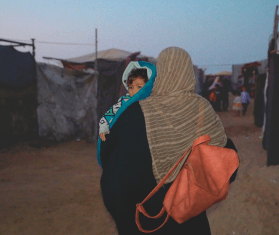Constant evacuation orders and bombings have displaced more than 1.9 million Palestinians in Gaza—approximately 90% of the population. Many are being crammed into smaller and smaller areas with inadequate water and sanitation services. As a result, preventable skin conditions are spreading, particularly among children.
When Israeli forces announce an evacuation order in Gaza, Palestinians are forced to move within minutes, and many have been displaced numerous times over the last 10 months of war. In Al-Mawasi, Doctors Without Borders/Médecins Sans Frontières (MSF) has partnered with the Palestinian Agricultural Development Association (PARC) to provide displaced people with emergency latrines, solar water pump systems, a water treatment plant, tents, and other support.


Displaced Palestinians are living in dilapidated tents without proper access to basic needs, and have to wait in line for hours to use latrines (pictured right). Palestine 2024 © Noor Daher/MSF
Hours-long lines for water in cramped camps
As evacuation orders by Israeli forces continue to compress people into ever-smaller areas along the increasingly cramped coastal areas of Deir al-Balah and Khan Younis, living conditions in nearby Al-Mawasi are getting worse. OCHA estimates that from July 22 to 26 alone, more than 190,000 Palestinians were displaced to Khan Younis and Deir al-Balah.
Those displaced in Al-Mawasi are living in dusty tents, overcrowded with family members and without proper access to food, water, and essential services such as sanitation and health care. People often have to wait in line for hours for water and even latrines, and are unable to regularly shower.
“The living conditions are extremely difficult,” explained PARC pediatrician Dr. Youssef Salaf Al-Farra. “Every day, we see between 300 to 400 cases at the medical clinic, of which 200 are related to skin conditions. Children are the most impacted, especially by skin conditions that are highly contagious.”

At least 16 evacuation orders in seven weeks
Between July 1 and August 21, Israeli forces issued at least 16 evacuation orders in Gaza. An estimated 213,000 Palestinians have been affected from the beginning of August to August 16 and 86% of Gaza has come under evacuation orders since the war began, according to OCHA.
During evacuations, people are forced to move in a rush and with very little forewarning, which can be particularly challenging for people with disabilities, women with children, and elderly people. Months of endless evacuation orders by Israeli forces have left many people empty-handed, without even a plastic bag of belongings or a single bar of soap.
As skin conditions spread, PARC, with support from MSF, has built over 300 latrines, including accessible latrines for people with physical disabilities in the Deir al-Balah camp, and has installed three solar water pump systems and provided primary health care to displaced people.
“There is no clean drinking water, resulting in diseases spreading,” said displaced mother Rasha Misbeh. “Children’s faces and bodies are becoming itchy. All the children are impacted by the spread of [skin] conditions—there is not a single child who isn’t impacted. Everyone is packed closely together, which is making it worse.”
Displaced from Al Nasser
Muhammed Abu Kmail
“It was very difficult to use the bathrooms. There were very few bathrooms—just enough for over 100 to 200 people. When this camp was set up, more bathrooms became available, including accessible ones."

Basic hygiene supplies blocked by Israel
For three months, MSF has tried to import 4,000 hygiene kits to improve the living conditions of displaced people, but has been blocked by Israeli authorities. The kits contain basic everyday items such as soap, toothbrushes, shampoo, and laundry powder. The scarcity of such items in Gaza means they are prohibitively expensive for people to purchase.
MSF continues to call for an immediate ceasefire in Gaza, as well as unimpeded safe access for staff and supplies to be able to enter the Strip and reach areas most in need of support.
Displaced from northern Gaza
Shahd Abu Samra
“Sometimes, we couldn't go to the bathroom at night. Sometimes my brother and father would accompany us. We live a very difficult life, together with the rest of the displaced people in the camp. There is a huge shortage in all basic services such as water, food, medicines, shelter, among many others."

MSF water and sanitation activities in Gaza
Water and sanitation is an important part of MSF’s response in Gaza, helping to curb the spread of diseases and skin infections, particularly among displaced people. MSF provides more than 600,000 liters of water per day through desalination at 40 water distribution points in Al-Mawasi, Deir al-Balah, Rafah, and Khan Younis. A new desalination unit in Al-Mawasi provides 30 cubic meters of drinking water per day, and a second is planned to be set up in Deir al-Balah by mid-September, which is expected to deliver 70 cubic meters per day.
Our partnership with PARC includes the construction of latrines for more than 30,000 people across six camps, distributing hygiene kits for 2,400 families, and providing clean drinking water to a population of 25,000 people per day. We also equipped a camp hosting 400 people with disabilities with accessible latrines and showers.




